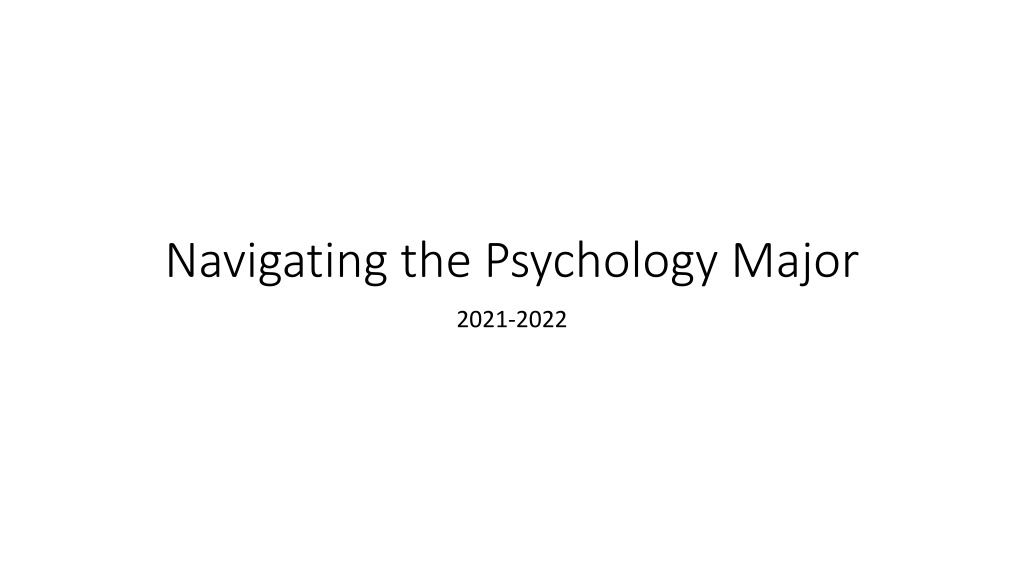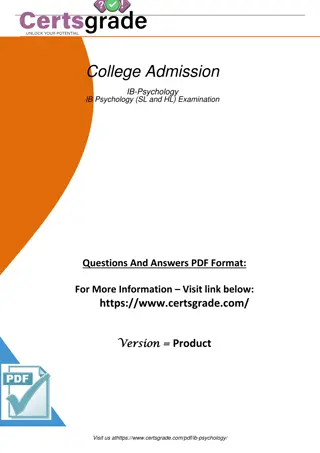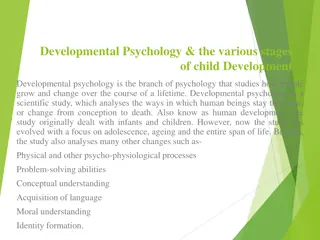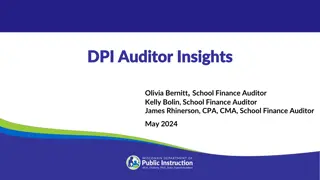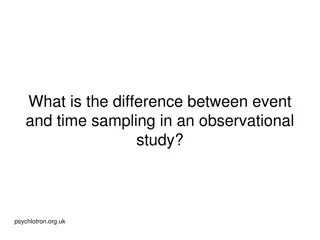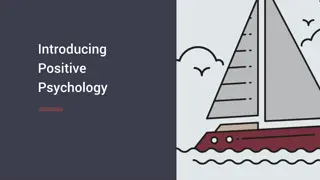Navigating the Psychology Major 2021-2022 Guidelines
The Psychology Major for 2021-2022 requires specific course completions and credit distributions for entrance and successful completion. Students need to fulfill prerequisites and select from a range of courses to meet degree requirements for the Bachelor of Arts and Bachelor of Science in Psychology, emphasizing diverse aspects of psychology such as cognitive neuroscience, social psychology, and clinical psychology.
Download Presentation

Please find below an Image/Link to download the presentation.
The content on the website is provided AS IS for your information and personal use only. It may not be sold, licensed, or shared on other websites without obtaining consent from the author. Download presentation by click this link. If you encounter any issues during the download, it is possible that the publisher has removed the file from their server.
E N D
Presentation Transcript
Navigating the Psychology Major 2021-2022
Entrance to Major *completed with C or better Psych 100 Psych 200 Stat 200 --offered @UP (prereq: Math 21) --offered @WC, only permitted in summer for UP students (prereq: Math 21) OR *completed with C or better 3 credits in General Social and Behavioral Sciences (GS) 29.1 credits completed with minimum 2.0 GPA 3 credits in General Quantification (GQ) *completed with C or better
Psychology Bachelor of Arts + 6 credits of GQ (and University requirements) 12 CREDITS TOTAL (NO MORE THAN 3 CREDITS FROM PSYCH 494, 491H, 493, 495, 496 or 480) 12 CREDITS TOTAL BUT AT LEAST 3 CREDITS (one class) FROM EACH GROUP MUST HAVE Psych 412*: Adolescence Psych 452: Learning & Memory Psych 455: Cog. Neuroscience Psych 413: Cognitive Dev. Psych 100 Psych 253: Psych of Perception Psych 256: Cognitive Psych Psych 260: Neurological Bases of Behavior Psych 261: Psych of Learning Psych 414: Social & Pers. Dev. Psych 456: Adv. Cognitive Psych 419: Sustainability Psych 457*: Psych of Language Psych 105 Psych 462: Physiological Psych Psych 420: Advanced Social Psych Psych 470: Abnormal Psych 421: Self & Social Judgment Psych 212: Developmental Psych Psych 221: Social Psych Psych 231: Gender Psych Psych 238: Personality Psych Psych 471: Psych of Adjustment Psych 422: Human Sexuality Stat/Psych 200 Psych 475: Fear & Stress Psych 423: Interpersonal Relationships Psych 424: Applied Social Psych Psych 476: Child Psychopathology Psych 301W (prereq: Stat/Psych 200) Psych 478: Clinical Neuropsych. Psych 425: Human Emotion Psych 243: Positive Psych Psych 269: Evolutionary Psych (prereq: Anth 21, Bisc 2, Biol 133, OR Biol 222) Psych 270: Abnormal Psych Psych 281: Industrial-Organization Psych Psych 426*: Language Acquisition Psych 479: Psych of Gender Psych 432: Multicultural Psych Psych 481: Clinical Psych Psych 490 (prereq: Psych 301W & 6 credits of Psych 400-level courses) Psych 438: Personality Theory Psych 482: Selection & Assess. Psych 441: Health Psych Psych 484: Work Att. & Motivation Psych 485: Leadership in Work Psych 445: Forensic Psych **complete ALL courses with C or better *only Psych 100 is required
Psychology Bachelor of Science + 6 credits of GQ, Engl 202A, degree options, (and University requirements) 12 CREDITS TOTAL (NO MORE THAN 3 CREDITS FROM PSYCH 494, 491H, 493, 495, 496 or 480) 12 CREDITS TOTAL BUT AT LEAST 3 CREDITS (one class) FROM EACH GROUP MUST HAVE Psych 412*: Adolescence Psych 452: Learning & Memory Psych 455: Cog. Neuroscience Psych 413: Cognitive Dev. Psych 100 Psych 253: Psych of Perception Psych 256: Cognitive Psych Psych 260: Neurological Bases of Behavior Psych 261: Psych of Learning Psych 414: Social & Pers. Dev. Psych 456: Adv. Cognitive Psych 419: Sustainability Psych 457*: Psych of Language Psych 105 Psych 462: Physiological Psych Psych 420: Advanced Social Psych Psych 470: Abnormal Psych 421: Self & Social Judgment Psych 212: Developmental Psych Psych 221: Social Psych Psych 231: Gender Psych Psych 238: Personality Psych Psych 471: Psych of Adjustment Psych 422: Human Sexuality Stat/Psych 200 Psych 475: Fear & Stress Psych 423: Interpersonal Relationships Psych 424: Applied Social Psych Psych 476: Child Psychopathology Psych 301W (prereq: Stat/Psych 200) Psych 478: Clinical Neuropsych. Psych 425: Human Emotion Psych 243: Positive Psych Psych 269: Evolutionary Psych (prereq: Anth 21, Bisc 2, Biol 133, OR Biol 222) Psych 270: Abnormal Psych Psych 281: Industrial-Organization Psych Psych 426*: Language Acquisition Psych 479: Psych of Gender Psych 432: Multicultural Psych Psych 481: Clinical Psych Psych 490 (prereq: Psych 301W & 6 credits of Psych 400-level courses) Psych 438: Personality Theory Psych 482: Selection & Assess. Psych 441: Health Psych Psych 484: Work Att. & Motivation Psych 485: Leadership in Work Psych 445: Forensic Psych **complete ALL courses with C or better *only Psych 100 is required
Psychology B.S. Degree Options Business (BUS) (15 credits from at least 3 groups) Quantitative Skills (QUANT) (15 credits from at least 4-5 groups) Life Sciences (LS) Neuroscience (NEURO) 15 credits from at least 3: 15 credits from at least 3: Genetics Biological Anthropology Biobehavioral Implications Biology and Chemistry 15 credits from at least 4: Genetics Physiology Organic Chemistry Cell Biology Other Topics 15 credits from at least 4-5: Category 1 (ECON, PLSC, BA, MKTG, ACCTG) Group A: MATH Group B*(optional): CMPSC Category 2 (Management, Law and ethics, Labor relations, Communication) Group C, Section 1: STAT Group C, Section 2: STAT Group D: CSE, PSYCH Category 3 (Global view, Diversity, History, Technology) 3 credits in Natural Sciences 6 credits in Natural Sciences 3 credits in Arts/Humanities 3 credits in Arts/Humanities 6 credits in Social & Behavioral Sciences 3 credits in Social & Behavioral Sciences 6 credits in Natural Sciences 3 credits in Natural Sciences List of supporting courses (Arts/Humanities, Natural Sciences, Social & Behavioral Sciences) that do NOT double count with general education or degree option 3 credits in Social & Behavioral Sciences
Psychology B.S.: Life Science Options (15 credits from at least 3 groups) GENETICS BIOLOGICAL ANTHROPOLOGY BIOLOGICAL IMPLICATIONS BIOLOGY AND CHEMISTRY BIOL 110: Biology: Basic Concepts and Biodiversity Keystone/General Education Course BIOL 141: Introduction to Human Physiology Keystone/General Education Course BIOL 155: Introduction to the Biology of Aging Keystone/General Education Course BIOL 161: Human Anatomy and Physiology I - Lecture Keystone/General Education Course BIOL 177: Biology of Sex Keystone/General Education Course CHEM 110: Chemical Principles I Keystone/General Education Course CHEM 111: Experimental Chemistry I Keystone/General Education Course CHEM 112: Chemical Principles II Keystone/General Education Course CHEM 113: Experimental Chemistry II Keystone/General Education Course CHEM 210: Organic Chemistry I CHEM 212: Organic Chemistry II CHEM 213: Lab in Organic Chemistry (NOTE: Due to overlapping content, students should not take both BIOL 141 and BIOL 161) ANTH 218: Genes, Evolution and Behavior Keystone/General Education Course ANTH 21: Introductory Biological Anthropology Keystone/General Education Course Any BBH course 101 or higher (except BBH 310) HDFS 417: Biocultural Studies of Family Organization ANTH 460: Human Genetics ANTH 22: Humans as Primates Keystone/General Education Course BIOL 133: Genetics and Evolution of the Human Species Keystone/General Education Course RHS 100: Introduction to Disability Culture Keystone/General Education Course ANTH 40: Biocultural Evolution ANTH 401: Human Evolution: The Material Evidence BIOL 222: Genetics RHS 300: Introduction to Rehabilitation and Human Services BBH 410: Developmental and Health Genetics RHS 403: Medical Aspects of Disability HPA 310: Health Care and Medical Needs NUTR 251: Introductory Principles of Nutrition Keystone/General Education Course
Psychology B.S.: Neuroscience Options (15 credits from at least 4 groups) GENETICS PHYSIOLOGY ORGANIC CHEMISTRY CELL BIOLOGY OTHER TOPICS BIOL 110: Biology: Basic Concepts and Biodiversity Keystone/General Education Course BIOL 133: Genetics and Evolution of the Human Species Keystone/General Education Course BIOL 222: Genetics BIOL 141: Introduction to Human Physiology Keystone/General Education Course BIOL 161: Human Anatomy and Physiology I - Lecture Keystone/General Education Course BIOL 472: Mammalian Physiology CHEM 202: Fundamentals of Organic Chemistry I CHEM 210: Organic Chemistry I BIOL 230W: Biology: Molecules and Cells Keystone/General Education Course BIOL 177: Biology of Sex Keystone/General Education Course BIOL 240W: Biology: Function and Development of Organisms Keystone/General Education Course BIOL 469: Neurobiology CHEM 212: Organic Chemistry II MICRB 106: Elementary Microbiology Keystone/General Education Course BIOL 409: Biology of Aging MICRB 201: Introductory Microbiology BBH 470: Functional and Integrative Neuroscience (NOTE: Due to overlapping content, students should not take both BIOL 141 and BIOL 161) MICRB 251: Molecular and Cell Biology I
Psychology B.S.: Business Options (15 credits from at least 3 groups) GROUP 2 GROUP 1 GROUP 3 (SECTION A: MANAGEMENT) BA 304: Management and Organization HPA 57: Consumer Choices in Health Care Keystone/General Education Course HPA 101: Introduction to Health Services Organization HPA 210: Health Care Payment HPA 211: Financial Decisions in Health Care Organizations HPA 301W: Health Services Policy Issues (or any higher-numbered HPA course) LER 305 MGMT 301: Basic Management Concepts (or any higher-numbered MGMT course) (SECTION A) ECON 14: Principles of Economics Keystone/General Education Course (SECTION A: GLOBAL VIEW) ENGR 451: Social Entrepreneurship GEOG 424: Geography of the Global Economy GEOG 439: Property and the Global Environment GLIS 102N: Global Pathways Keystone/General Education Course HPA 401: Comparative Health Systems IB 303: International Business Operations LA 202: Innovation and Entrepreneurship in the Liberal Arts ECON 102: Introductory Microeconomic Analysis and Policy Keystone/General Education Course ECON 104: Introductory Macroeconomic Analysis and Policy Keystone/General Education Course ECON 302: Intermediate Microeconomic Analysis Keystone/General Education Course (or higher-numbered ECON course) PLSC 412: International Political Economy PLSC 444: Government and the Economy PLSC 481: Global Political Economy PLSC 490: Policy Making and Evaluation (SECTION B: DIVERSITY) AFAM/HIST 210: Freedom's First Generation: African American Life and Work, from the Civil War to World War II Keystone/General Education Course AFAM/LER/PLSC 445Y: Politics of Affirmative Action AFAM/SOC 409: Racial and Ethnic Inequality in America AFR/IB/PLSC 440: Globalization and Its Implications CED/WMNST 420W: Gender and International Development LER/WMNST 136: Race, Gender, and Employment Keystone/General Education Course LER 201 LER/RHS 410 LER/WMNST 472 LER 475 RHS 300: Introduction to Rehabilitation and Human Services (SECTION B: LAW AND ETHICS) BA 302: Supply Chains BLAW 243: Legal Environment of Business LER 460 PHIL 119: Ethical Leadership Keystone/General Education Course PHIL 406: Seminar in Business Ethics PHIL/STS 407: Seminar in Philosophy of Technology PHIL 418: Seminar in Ethical Theory PHIL/STS 432: Medical and Health Care Ethics SCM 301: Supply Chain Management (SECTION B) BA 301: Finance FIN 301: Corporation Finance (or any higher-numbered FIN course) (SECTION C) BA 303: Marketing MKTG 301: Principles of Marketing (or any higher-numbered MKTG course) (SECTION C: LABOR RELATIONS) LER 100 LER 304 Any LER 400-level course (SECTION D) ACCTG 211: Financial and Managerial Accounting for Decision Making (SECTION C: HISTORY) HIST 151 HIST 155: American Business History Keystone/General Education Course (SECTION D: COMMUNICATION) CAS 352: Organizational Communication Keystone/General Education Course CAS 450W: Group Communication Theory and Research CAS 452: Organizational Communication Theory and Research Keystone/General Education Course ENGL 419: Advanced Business Writing ENGL 460: Business and Literature LER 464 HIST/LER 458Y: History of Work in America (SECTION D: TECHNOLOGY) IST 110: Information, People and Technology Keystone/General Education Course
Psychology B.S.: Quantitative Options (15 credits from at least 4-5 groups) GROUP A GROUP B (optional) GROUP C, SECTION 1 GROUP C, SECTION 2 GROUP D MATH 38: Elementary Linear Algebra Keystone/General Education Course MATH 110: Techniques of Calculus I Keystone/General Education Course MATH 111: Techniques of Calculus II Keystone/General Education Course MATH 140: Calculus With Analytic Geometry I Keystone/General Education Course MATH 141: Calculus with Analytic Geometry II Keystone/General Education Course STAT 319: Elementary Mathematical Statistics May only take one of these courses May take only one of these courses CAS 483: Communication and Information Technology II STAT 318: Elementary Probability STAT 415: Introduction to Mathematical Statistics CMPSC 101: Introduction to Programming Keystone/General Education Course CMPSC 121: Introduction to Programming Techniques Keystone/General Education Course CMPSC 201: Programming for Engineers with C++ Keystone/General Education Course CMPSC 203: Introduction to Spreadsheets and Databases Keystone/General Education Course CMPSC 122: Intermediate Programming STAT 414: Introduction to Probability Theory STAT 416: Stochastic Modeling PSYCH 404: Principles of Measurement STAT 418: Introduction to Probability and Stochastic Processes for Engineering STAT 460: Intermediate Applied Statistics STAT 462: Applied Regression Analysis STAT 464: Applied Nonparametric Statistics
